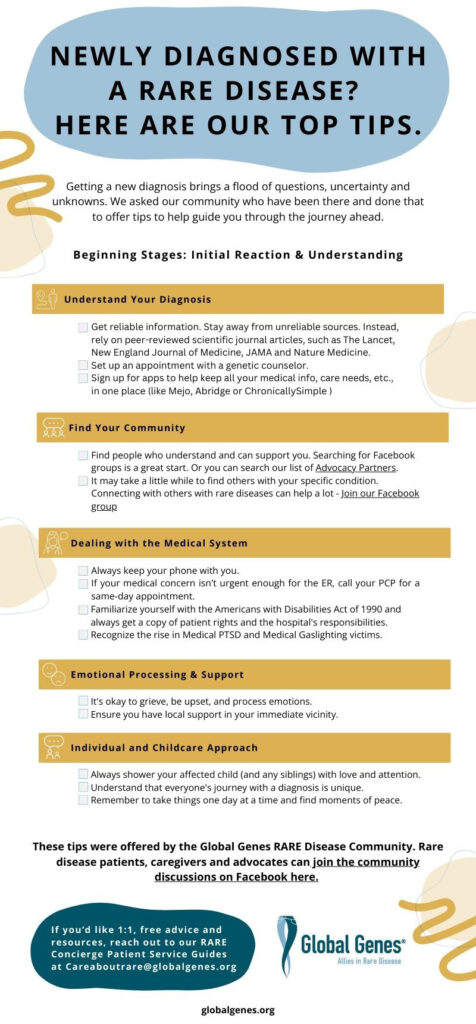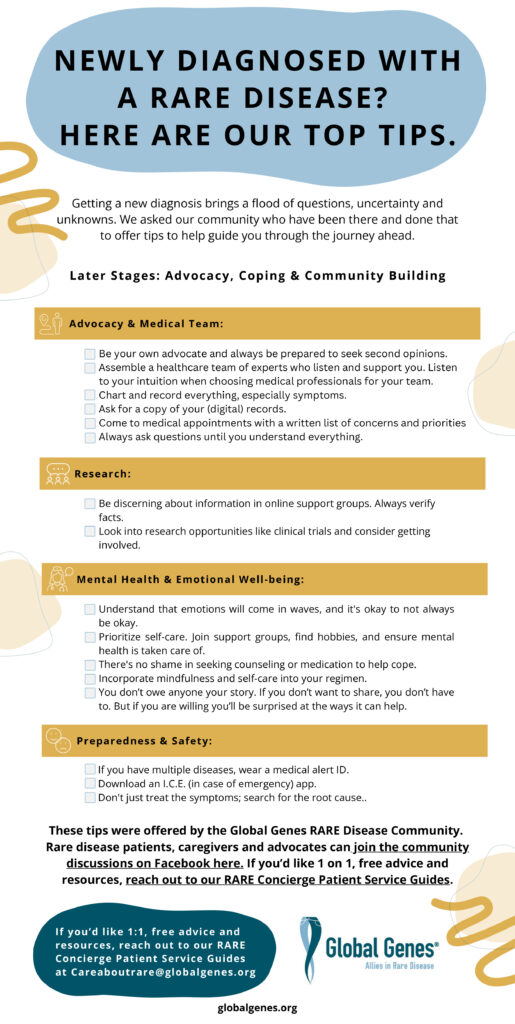Getting a new diagnosis brings a flood of questions, uncertainty and unknowns. We asked our community who have been there and done that to offer tips to help guide you through the journey ahead.
Beginning Stages: Initial Reaction & Understanding
Understand Your Diagnosis:
- Get reliable information. Stay away from unreliable sources. Instead, rely on peer-reviewed scientific journal articles, such as The Lancet, New England Journal of Medicine, JAMA and Nature Medicine.
- Set up an appointment with a genetic counselor.
- Sign up for apps to help keep all your medical info, care needs, etc., in one place (like Mejo, Abridge or ChronicallySimple )
Find Your Community
- Find people who understand and can support you. Searching for Facebook groups is a great start. Or you can search our list of Advocacy Partners.
- It may take a little while to find others with your specific condition. Connecting with others with rare diseases can help a lot – Join our Facebook group
Dealing with the Medical System:
- Always keep your phone with you.
- If your medical concern isn’t urgent enough for the ER, call your PCP for a same-day appointment.
- Familiarize yourself with the Americans with Disabilities Act of 1990 and always get a copy of patient rights and the hospital’s responsibilities.
- Recognize the rise in Medical PTSD and Medical Gaslighting victims.
Emotional Processing & Support:
- It’s okay to grieve, be upset, and process emotions.
- Ensure you have local support in your immediate vicinity.
Individual and Childcare Approach:
- Always shower your affected child (and any siblings) with love and attention.
- Understand that everyone’s journey with a diagnosis is unique.
- Remember to take things one day at a time and find moments of peace.
Later Stages: Advocacy, Coping & Community Building
Advocacy & Medical Team:
- Be your own advocate and always be prepared to seek second opinions.
- Assemble a healthcare team of experts who listen and support you. Listen to your intuition when choosing medical professionals for your team.
- Chart and record everything, especially symptoms. Ask for a copy of your (digital) records.
- Come to medical appointments with a written list of concerns and priorities
- Always ask questions until you understand everything.
Research:
- Be discerning about information in online support groups. Always verify facts.
- Look into research opportunities like clinical trials and consider getting involved.
Mental Health & Emotional Well-being:
- Understand that emotions will come in waves, and it’s okay to not always be okay.
- Prioritize self-care. Join support groups, find hobbies, and ensure mental health is taken care of.
- There’s no shame in seeking counseling or medication to help cope.
- Incorporate mindfulness and self-care into your regimen.
- You don’t owe anyone your story. If you don’t want to share, you don’t have to. But if you are willing you’ll be surprised at the ways it can help.
Preparedness & Safety:
- If you have multiple diseases, wear a medical alert ID.
- Download an I.C.E. (in case of emergency) app.
- Don’t just treat the symptoms; search for the root cause.
These tips were offered by the Global Genes RARE Disease Community. Rare disease patients, caregivers and advocates can join the community discussions on Facebook.
If you’d like 1:1, free advice and resources, reach out to our RARE Concierge Patient Service Guides.



Stay Connected
Sign up for updates straight to your inbox.
